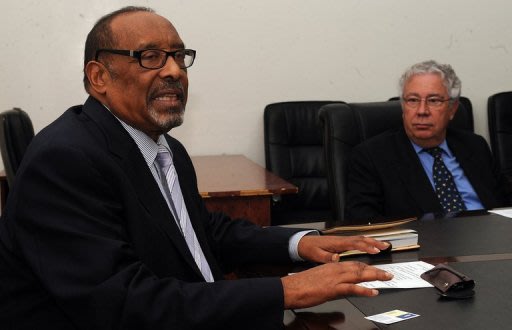- Banknotes in piles the size of desks lie on a dusty street guarded by dozing civilians -- money exchange offices in Somaliland, the northern breakaway state of war-torn Somalia. While war rages in southern Somalia -- where regional armies and government troops battle Shebab fighters allied to Al-Qaeda -- the relative stability achieved in Somaliland offers a sliver of hope for the rest of the anarchic land.
"We are a peaceful and democratic country," said Ahmed Mohamed Silanyo, president of the self-declared country which broke away from Somalia in 1991, the year the Horn of Africa nation erupted into all-out civil war.
"People have said we are an oasis of peace in the Horn of Africa," added Silanyo, who took the helm of this nation the size of England in peaceful 2010 polls.
Like Somalia's capital Mogadishu today, Somaliland's capital Hargeisa was left in ruins by bombing raids in the bloody civil war. But while the wreckage of destroyed fighter jets still lies on Hargeisa's bumpy airstrip, the scars of the conflict are rapidly fading, as bullet-riddled ruins are replaced by a spurt of new buildings.
Traders sell plump melons and bananas from farms outside the city on bustling street corners, while women offer milk from the camels that are key to Somaliland's mainly rural and pastoral economy. "It is not always easy, but every year there are improvements in the economy," said businesswoman Amina Farah Arshe, who runs a fleet of fishing boats and supports women entrepreneurs.
As international diplomatic, military and relief efforts focus on ending the conflict in southern Somalia Somaliland's experience offers lessons in how to build peace, Silanyo said. "It was not imposed by any political group, but by an agreement of all people, clans and leaders, to come together to make reconciliation and restore peace," Silanyo told AFP in his modest presidential compound.
But while Somaliland is bound together by a unifying ambition for formal independence and international recognition, southern Somalia is riven by brutal land and power struggles fueled by clan divides and religious beliefs.
"Somaliland demonstrates it is possible to build peace and stability in Somalia" if there is a "clear objective" -- in this case independence -- said Georges-Marc Andre, EU ambassador to Somalia, the largest donor here. "In south and central Somalia however, for the time being, the interests are too diverse," Andre added.
Somaliland is certainly not without problems, but does appear to be trying to tackle them.
"The problems of sexual violence are many," said Aswan Mahmud, one of four female police prosecutors here, who focuses on violent crimes against women and children, a problem in a traditional society struggling to rebuild after war.
"In the beginning, it was tough and there was hostility from the public to my work, but things have improved ... I'll keep going because I am committed to provide better access to justice for women," Mahmud added.
But Somaliland also suffers from the spillover violence from its violent neighbours, beset by Islamist fighters as well by pirates who threaten shipping far across the Indian Ocean. Tensions remain high with the neighbouring autonomous Somali region of Puntland over contested border regions potentially rich in oil.
Officers inside Hargesia's newly-refurnished prison are preparing cells for the transfer of 19 pirates Somaliland has agreed to host -- with more expected to follow -- captured by international navies and convicted in the Seychelles.
It is a sensitive matter for fiercely independent Somaliland, keen to win favour with the international community by showing its commitment to fight piracy, but also wary since the convicts are from Somalia.
"Their coming ... is an issue for political leaders, but we will host them here," said commander Omar Said Ali Ali diplomatically, as prisoners stared out from behind bars.
Some Western countries argue Somaliland deserves to become a fully-fledged country and thus gain access to more aid, but the African Union is wary of setting a precedent that may spur secessions across the continent.
"Even if we do not yet have the recognition of the international community we engage with the world, and we hope and expect recognition will come to Somaliland," the president added.
Source: AFP

No comments:
Post a Comment